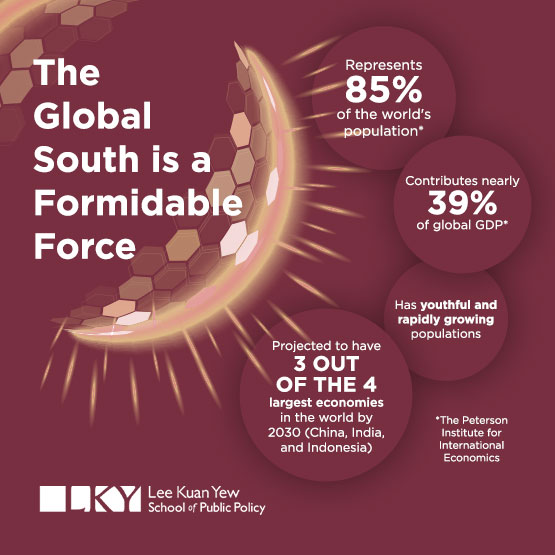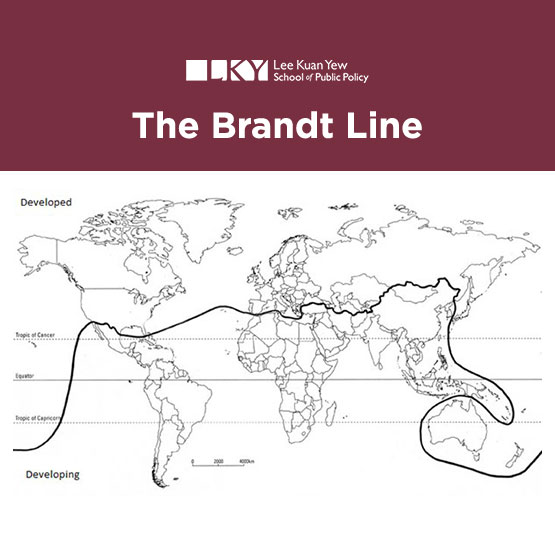The long-held concept of the New World Order, characterised by an international community led by the USA and defined by globalisation, is gradually losing traction. A new worldview is emerging, recognising the significance of the Global South and its growing importance on the global stage.
A Growing Global Impact
With its expanding economic power and political prominence, the Global South is emerging as a significant voice in international politics, challenging the longstanding bipolarity that once existed between the USA and the Soviet Union, and now between the USA and China.
With Brazil taking the Presidency of the G20 this year, the country’s President Luiz Inacio Lula da Silva seeks to use the position to give the Global South a larger voice in world decision making. "There are those who question the concept of the Global South, saying that we are too diverse to fit together. But there are many more interests that unite us than differences that separate us," he said.
As part of this push, Lula called for the African Union to become an official member of the G20. This move is supported by EU foreign policy chief Josep Borrell. "Brazil has focused on the interests and concerns of the so-called Global South. It is no longer a dialogue just between the great powers," he said.
While the vast size of this bloc — not all are from the southern hemisphere — means there are inevitable differences between member states, there remains sufficient areas for cooperation, as the unity is not defined by geographical boundaries but by geopolitical, economic, and even domestic political stances. This unity positions the Global South as a formidable force capable of challenging existing geopolitical and economic systems.

Where is Its Impact Being Felt?
Take climate change, for example. Many Global South member states are in regions prone to extreme weather events such as heatwaves, droughts, typhoons, and rising sea levels. Together, the Global South advocates for climate justice, emphasising historical responsibility and the principle of common but differentiated responsibilities.
Global manufacturing and trade is another domain where the Global South is altering the playing field. While policymakers in the USA and EU have imposed hefty tariffs on Chinese-made electric vehicles, citing concerns over perceived overcapacity and unfair competition, members of the Global South have opted not to adopt similar measures.
“These countries are not agitating about clean-energy overcapacity,” says Professor Danny Quah, Dean and Li Ka Shing Professor of Economics at Lee Kuan Yew School of Public Policy. “The world needs clean, cheap energy. To gain any reasonable measure of control over their own destiny, emerging economies will need massive, sustained bursts of energy … for a long while still, there is no state of the world where there are too many EVs, too much electric battery storage, or too many solar panels.”
Another significant area of impact is the Global South’s stance on conflict. While the West sought to condemn Russia’s invasion of Ukraine, some members of the Global South adhered to a policy of non-alignment, preventing the West from dominating its voice in a push for global consensus.
Although some commentators interpret this, along with other diverging interests, as anti-West, others see it as reflecting the increased confidence and self-interest of bloc members. India’s Minister of External Affairs, Subrahmanyam Jaishankar, articulated this position at the Munich Security Conference in February 2024 “Europe has to grow out of the mindset that Europe’s problems are the world’s problems, but the world’s problems are not Europe’s problems.”
How Has the Global South Evolved?
The term “Global South” was originally coined in 1969 by American political activist Carl Oglesby. In his writings about the Vietnam War, Oglesby used the term to describe a group of countries subjected to the dominance of the “Global North” through political and economic exploitation.
The first widely recognised visualisation of the Global South emerged in 1980 with the introduction of the Brandt Line. This imaginary line, spanning the globe at approximately 30 degrees latitude, was created to highlight the disparity between the affluent countries in the north and the less affluent countries in the south.

Image of The Brandt Line by Jovan.gec, CC BY-SA 4.0 via Wikimedia Commons
Many countries in the Global South were once former colonies and are now part of the Non-Aligned Movement, a forum of 120 of countries committed to shared interests including independence, territorial integrity, and anti-imperialism.
For several decades, the term Global South was used interchangeably with the more commonly known concept of the “Third World”, a phrase that has since fallen out of favour due to its negative associations with poverty and instability. Over the last 15 years, the term “Global South” has gained traction among journalists, academics, and policymakers reflecting the bloc's growing importance.
The definition of which countries constitute the Global South is loosely defined and subject to various interpretations. A 2021 study of numerous academic papers on the topic identified several definitions, with the majority centred around terms such as developing, decolonised, and socio-economically marginalised.
Another perspective on the bloc is provided by the Voice of Global South Summit, held in January 2023 in India, which invited representatives from 125 countries (notably excluding China).
Regardless of the definition, the Global South is a formidable entity. An estimate by The Peterson Institute for International Economics, based on GDP per capita, suggests, “The Global South represents 85 per cent of the world's population and nearly 39 per cent of global GDP”.
Moreover, many of these countries have youthful and rapidly growing populations, particularly in African nations, coupled with rapidly expanding economies. Projections indicate that by 2030, three of the four largest economies in the world will be in the Global South, led by China, India, and Indonesia, promising a significantly altered balance of power and influence in the near future.
Looking Ahead
The rise of the Global South has already shifted the global power balance from bipolarity to multipolarity, with the Global South playing a pivotal role. Bloc members have become vocal and influential actors in international relations, advocating for issues that benefit their interests rather than following the lead of the superpowers and the European Union.
The upcoming US election will have a significant impact on the bloc. The Republicans promise an “America First” policy and climate change denial, while the Democrats hope to re-establish America’s leadership on the international stage and support decarbonisation.
Regardless of the election outcome, the long-term economic growth of the Global South is inevitable, necessitating a shift in the worldview of incumbent powers to accommodate this emerging player. Furthermore, as geopolitical rivalry intensifies between the US and China, the ability of the Global South to champion its own issues and choose its own path will strengthen its significance in the coming years.